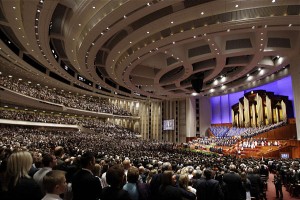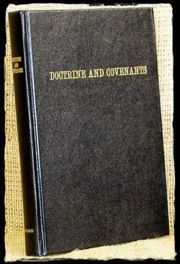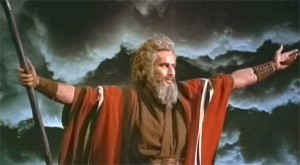Mormon blogger Jana Riess writes about “selective obedience” in her April 7th (2014) blog. She’s responding to a comment made by LDS apostle Robert Hales at last weekend’s General Conference. In his address, Mr. Hales contrasted three types of behavior: disobedience (rejection of God’s law), selective obedience, and mature Christ-like obedience. As reported by Deseret News, Mr. Hales said,
“At times members may participate in ‘selective obedience,’ claiming to love God and honor God while picking and choosing which of His commandments and teachings— and the teachings and counsel of His prophets — we will fully follow.”
 In her blog, Ms. Riess takes issue with Mr. Hales’ teaching, noting that “selective obedience is where most of us live. Of course we pick and choose. Of course we have to pray and make decisions.”
In her blog, Ms. Riess takes issue with Mr. Hales’ teaching, noting that “selective obedience is where most of us live. Of course we pick and choose. Of course we have to pray and make decisions.”
Ms. Riess contrasts her chosen “selective obedience” with those who take an all-or-nothing approach to LDS “prophetic authority.” There are those who believe “every statement that proceeds from a church leader’s mouth is gospel,” and there are those who “witness the overwhelming evidence of historical change in the Mormon tradition and conclude that little or nothing in the religion can be inspired.”
Ms. Riess recognizes that historical evidence exists that demonstrates past Church leaders have been wrong on occasion:
“that God denounced interracial marriage, for example, or that African-Americans would never be worthy to hold the priesthood by divine decree. Brigham Young taught that polygamy was an essential practice to prepare a person for life in the Celestial Kingdom (though some of his other statements qualified this). He also believed that there might be a Loch Ness-style monster living in the Bear Lake, which traveled via an underground tunnel to its other home in the Great Salt Lake.
“Clearly, none of this is current LDS teaching.
“So I’m not on board with the idea that I should simply accept anything proposed in General Conference, even if it is reiterated at different times by different general authorities…”
Yet Ms. Riess is not “ready to dismiss the many beautiful, true, and thought-provoking things that were said at General Conference” and therefore takes a middle-of-the-road approach. She chooses which “prophetic” teachings she will accept, and which she will dismiss.
In some ways, this reminds me of C.S. Lewis’ famous trilemma, expressed in his book Mere Christianity:
“I am trying here to prevent anyone saying the really foolish thing that people often say about Him: I’m ready to accept Jesus as a great moral teacher, but I don’t accept his claim to be God. That is the one thing we must not say. A man who was merely a man and said the sort of things Jesus said would not be a great moral teacher. He would either be a lunatic — on the level with the man who says he is a poached egg — or else he would be the Devil of Hell. You must make your choice. Either this man was, and is, the Son of God, or else a madman or something worse. You can shut him up for a fool, you can spit at him and kill him as a demon or you can fall at his feet and call him Lord and God, but let us not come with any patronising nonsense about his being a great human teacher. He has not left that open to us. He did not intend to.”
Like Jesus in Lewis’ trilemma argument, Mormonism has not left open the option that Jana Riess prefers — that Mormon “prophetic authority” can go terribly wrong sometimes, but at other times should be embraced as “beautiful, true and thought-provoking.”
This self-same “prophetic authority” has decisively pronounced the all-or-nothing argument that Ms. Riess rejects.
 Mormon Scripture says of Mormon elders:
Mormon Scripture says of Mormon elders:
“And whatsoever they shall speak when moved upon by the Holy Ghost shall be scripture, shall be the will of the Lord, shall be the mind of the Lord, shall be the word of the Lord, shall be the voice of the Lord, and the power of God unto salvation. Behold, this is the promise of the Lord unto you, O ye my servants.” (D&C 68:4-5)
Mormon Scripture says of Joseph Smith (and by extension, subsequent Mormon prophets):
“thou shalt give heed unto all his words and commandments which he shall give unto you as he receiveth them, walking in all holiness before me; For his word ye shall receive, as if from mine own mouth, in all patience and faith.” (D&C 21:4-5)
The Mormon manual Gospel Principles explains Mormon Scripture:
“A prophet is a man called by God to be His representative on earth. When a prophet speaks for God, it is as if God were speaking (see D&C 1:38).”
If Mormons leaders holding “prophetic authority” speak for an omniscient God, then they cannot be wrong when speaking on spiritual matters. They cannot lead the Church astray with false doctrine. If they do, they are not speaking for God. Those holding “prophetic authority,” in their roles as prophets, seers and revelators, have taught:
“I say to Israel, the Lord will never permit me or any other man who stands as President of this Church to lead you astray. It is not in the program. It is not in the mind of God.” (Discourses of Wilford Woodruff, 212-213)
“We are most fortunate to have a living prophet at the head of the Church to guide us, and all who heed his counsel will be partakers of the promised blessings which will not be enjoyed by those who fail to accept his messages…Whose side are we on? When the prophet speaks the debate is over.” (N. Eldon Tanner [First Counselor in the First Presidency], “The Debate is Over,” Ensign, August 1979, 2)
“One cannot successfully attack true principles or doctrine, because they are eternal. The revelations that came through the Prophet Joseph Smith are still correct! …when you pick up a stick you pick up both ends. And so it is with the gospel. As members of the Church we need to accept all of it.” (James E. Faust, “Lord, I Believe; Help Thou Mine Unbelief,” Ensign, November 2003, 21-22)
Early Mormon apostle Orson Pratt proffered:
“If one portion of the doctrines of the Church is true, the whole of them are true. If the doctrine of polygamy, as revealed to the Latter-day Saints, is not true, I would not give a fig for all your other revelations that came through Joseph Smith the Prophet; I would renounce the whole of them, because it is utterly impossible, according to the revelations that are contained in these books, to believe a part of them to be divine—from God—and part of them to be from the devil; that is foolishness in the extreme…” (Orson Pratt, Journal of Discourses 17:224)
As much as Jana Riess and other liberal Latter-day Saints would like to approach Mormon “prophetic authority” as one might approach a dinner buffet, Mormonism does not give them that option. President James Faust did not allow for that kind of thinking:
“Revelations from the prophets of God are not like offerings at the cafeteria, some to be selected and others disregarded.” (ibid., Ensign, November 2003, 22)
 Mormons cannot have their cake and eat it, too. Either the prophets speak for God and what they teach is true, or they do not speak for God at all. Mormonism leaves no room for any conclusion other than (to borrow from C. S. Lewis),
Mormons cannot have their cake and eat it, too. Either the prophets speak for God and what they teach is true, or they do not speak for God at all. Mormonism leaves no room for any conclusion other than (to borrow from C. S. Lewis),
“A man who was merely a man and said the sort of things the Mormon prophet(s) said would not be a great moral teacher. He would either be a lunatic — on the level with the man who says he is a poached egg — or else he would be the Devil of Hell. You must make your choice. Either what this man spoke, and speaks, is ‘the will…mind…word…voice of the Lord, and the power of God unto salvation,’ or else he is a madman or something worse.”
And if the Mormon Church is led by a “madman,” if what its prophets, seers and revelators say are lies or delusions, then the Mormon Church is a fraud and the eternal promises it makes are null and void. Prophet Gordon B. Hinckley insisted,
“Each of us has to face the matter – either the Church is true, or it is a fraud. There is no middle ground. It is the Church and kingdom of God, or it is nothing.” (“Loyalty,” Ensign, May, 2003, 60).
Dear Mormons, it is “foolishness in the extreme” to believe that a true prophet, whose very words are “scripture,” would teach false doctrine (“whatever comes from the voices of those who hold that authority is scripture, no matter of what they may speak,” J. Reuben Clark, Jr. [First Counselor in the First Presidency], Conference Reports, April 1944, 112).
In truth it is all-or-nothing. The Mormon Church is the kingdom of God…or nothing. The conclusion is inescapable: The Church of Jesus Christ of Latter-day Saints, by its own definition, is nothing.
But do not lose hope my friends, for here…here is something. Here is our nothing covered by God’s all.

“At times members may participate in ‘selective obedience,’ claiming to love God and honor God while picking and choosing which of His commandments and teachings— and the teachings and counsel of His prophets — we will fully follow.”
Strange isn’t it, the people most guilty of selective obedience are the Mormon prophets. They certainly follow OT laws, the most obvious being the command to give money, falsely called tithing to make it look genuine, but what about stoning for adultery, why not sacrifice a few goats in the Temple? Shouldn’t they, along with a myriad of other laws, be included?
The simple fact is the LDS is & always has been a collection of ever changing & often conflicting beliefs, from it’s founding 200 years ago to the present day, the entire LDS ‘church’ has practised selective obedience with it’s so called prophets leading from the front.
With all due respect to Jana Riess, I think that comments like hers reveal precisely why she is a kind of Latter-day Saint that LDS General Authorities rightly warn Latter-day Saints not to be. “Selective obedience” is not to be lauded, certainly not as an expression of arbitrary or preference-driven cherry-picking. If the LDS prophets are prophets, then treat them as prophets. If the LDS faith is true, then treat it like the true faith. If they aren’t prophets, then treat them as non-prophets; if it isn’t the true faith, then treat it as an erroneous faith. But let’s not be so arrogant as to pretend that our selfish cherrypicking defines the boundaries of the cosmos.
It’s not easy being a Mormon these days . Faced with more and more public exposure
about their ” unique ” doctrines of the recent past , they have little choice but to
downplay or deny some of them , just like their P.R. Dept has been doing in a
accelerated effort the last couple of decades . Keep in line ! these members are
told . But that can have serious consequences when it comes to following certain
religious leaders , especially today —Matt 15:14
Of course there is a growing number of Mormons who have rightly discerned that they
cannot trust their leaders to consistently feed them the quality spiritual food they
were promised . These Mormons are walking free of following these men . We’re here
to point them to a source of spiritual truth that will be nourishing and will heal their
souls . We point them to Jesus , not a organization . What He gave His apostles to
preach was refreshing and spiritually liberating then , and it still is today . No more
vacillating and manipulation by latter days prophets to follow .
In the topic article it says
This happens all the time, Just look at the Word Of Wisdom. The LDS only follow parts of that, the dont drink coffee and tea part, and it does not say, Coffee and Tea, it says, Hot Drinks, So they only define what they want so they can still drink what they want.
My guess is what we’re dealing with her sort of comes under the heading of “social Mormons” or maybe the “New Order Mormons”. I think they’re in a transitional stage and are working their way out of the program. As our former Mormon friends know, it takes a considerable amount of time to work through the various stages of leaving. These folks have left Mormonism, they just don’t know it yet!
Here’s something from another site:
I think the Cafeteria Mormon is the better term and has always been lived by many Mormons depending on where they live, and if they are BIC or converts.
It seems to encompass those that are predominately cultural, general familial Mormons. They do certain things as expected and ignore the rest.
There is a great article written by Kirby on this subject of the different kinds of Mormons. I’ll see if I can find it.
Yup, Here it is, reposted from archives in 2012~
http://www.sltrib.com/sltrib/lifestyle/54003962-80/mormons-church-percen…
Sorry about the faulty link I just posted. Try this.
http://www.sltrib.com/sltrib/lifestyle/54003962-80/mormons-church-percent-believe.html.csp
Mormons are not monolithic as to how they approach the religion.
Andy Watson travels up to Utah every day. He’d do a turn-around at a truck stop up there. He said the place was full of Jack Mormons; sitting there smoking and drinking coffee. They obviously weren’t buying into the program too heavily. There are social Mormons who stick around merely for the culture and familial ties. The New Order Mormons know the score but like some aspects of Mormonism. They are the picker and choosers when it comes to doctrine and practice. I always wonder how these types of Mormons I’ve mentioned don’t get heavy duty pressure to conform or are not effected when pressure is applied. I suppose there’s a way to play the game.
We do have Questioning Mormons, Naive True Believing Mormons and of course our favorite, the Arrogant True Believing Mormon.
Geographic location has something to do with what Mormonism is like culturally and how a Mormon lives it. Some areas are more cult like than others I assume.
It must be terrible to live with such cognitive dissonance. I really don’t know how they do it. To believe in Mormon “prophets” you must literally call black – white and white – black.